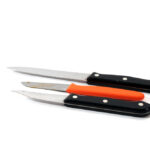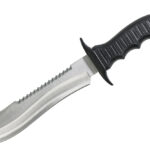New Criminal Offences Relating to Possessing or Using Knives in NSW

The NSW government has just doubled the penalties for knife crimes by introducing fresh indictable offences (which are offences that can be referred to a higher court, such as the District Court) into the Crimes Act 1900 (NSW), replacing the summary offences (which are offences that are finalised in the Local Court) under the Summary Offence Act 1988 (NSW).
Here’s a summary of the changes.
The New Offences
The Criminal Legislation Amendment (Knife Crimes) Bill 2023, which recently passed introduces two new offences to the Crimes Act 1900 (NSW).
It is now an offence under section 93IB of the Act to be in custody of a knife in a public place or a school.
This fresh offence carries a maximum penalty of a fine of $4,400, imprisonment for 4 years, or both.
A further offence has been introduced into section 93IC of the Act which applies if a person uses or carries a knife that is visible, if the use or carrying occurs:
- In the presence of a person; and
- In a public place or a school; and
-
In a way that is likely to cause a reasonable person to reasonably fear for the person’s safety.
This offence carries a maximum penalty up to $11,000, imprisonment for 4 years, or both.
A ‘knife’ is includes a knife blade and a razor blade.
A ‘public place’ includes any place or part of premises that is open to the public, or is used by the public whether or not on payment of money or other consideration, whether or not the place or part is ordinarily so open or used and whether or not the public to whom it is open consists only of a limited class of persons.
Both offences will be Table 1 offences under the Criminal Procedure Act 1986, meaning they will be tried summarily unless the prosecution or defendant elects otherwise.
Statutory Defence
A statutory defence (which is an offence relating specifically to the offence) exists for both offences if the accused person establishes ‘on the balance of probabilities’ (in other words, more likely than not) that he or she had a reasonable excuse for carrying the knife.
Under the Act, a reasonable excuse is where it was necessary to carry or use the knife for:
- The lawful pursuit of the person’s occupation, education or training, or
- The preparation or consumption of food or drink, or
- Participation in a lawful entertainment, recreation or sport, or
- The exhibition of knives for retail or other trade purposes, or
- An organised exhibition by knife collectors, or
- The wearing of an official uniform, or
- Genuine religious purposes, or
- During travel to or from or incidental to any of these activities.
Carrying a knife for the purposes of self-defence or defence of another is not a reasonable excuse.
General Legal Defences
General criminal law defences also apply to the offences.
These defences include self-defence, duress and necessity.
Where evidence of a general legal defence is raised, the onus then shifts to the prosecution to prove beyond a reasonable doubt that the defence does not apply to the circumstances.
If the prosecution is unable to do this, the defendant is entitled to an acquittal; in other words, to a verdict of not guilty.
Abolishment of Identical Summary Offences
Prior to this change, identical knife offences existed under section 11C and section 11E of the Summary Offences Act 1988.
Under section 11C of the Act an offence applied if a person was, without reasonable excuse, in custody of a knife in a public place or a school. This offence carried a maximum penalty of a fine of $2,200, imprisonment for 2 years, or both.
A further offence was provided under section 11E of the Act which applies if a person uses or carries a knife that is visible in a public place or a school. This offence carried a maximum penalty of a fine of $5,500, imprisonment for 2 years, or both.
These offences have now been abolished.
Remaining Summary Offences
A number of knife-related offence remain under the Summary Offence Act 1988.
Under section 11D of the Act, an offence exists in a parent authorises or permits their child to to be in custody of a knife in a public place or a school.
This offence carries a maximum penalty of a $550 fine.
Under section 11F of the Act, it is an offence to sell a knife to a child under the age of 16 years. This offence carries a maximum penalty of a $5,500 fine. A defence exists to this offence if he person selling the knife believed on reasonable grounds that the child was of or above the age of 16 years.
Receive all of our articles weekly
Related Articles
RELATED LEGISLATION
- Section 11C Summary Offences Act 1988 | Custody of Knife in Public Place (repealed offence)
- Section 11E Summary Offences Act 1988 | Wielding Knife in Public Place (repealed offence)
- Section 11F Summary Offences Act 1988 | Sale of Knives to Children
- Section 11D Summary Offences Act 1988 | Parents Who Allow Children to Carry Knives






